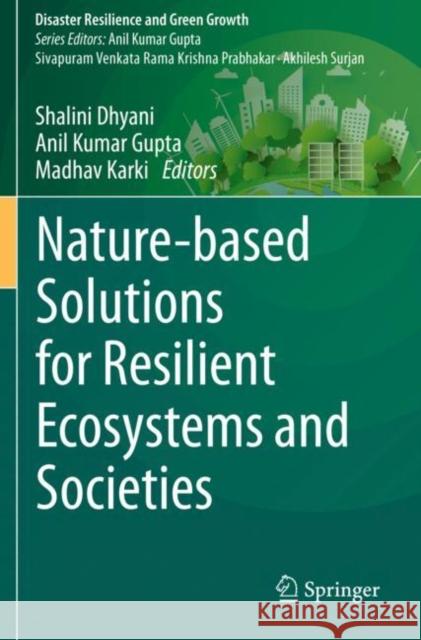Nature-Based Solutions for Resilient Ecosystems and Societies » książka



Nature-Based Solutions for Resilient Ecosystems and Societies
ISBN-13: 9789811547140 / Angielski / Miękka / 2021 / 455 str.
Nature-Based Solutions for Resilient Ecosystems and Societies
ISBN-13: 9789811547140 / Angielski / Miękka / 2021 / 455 str.
(netto: 573,71 VAT: 5%)
Najniższa cena z 30 dni: 578,30
ok. 16-18 dni roboczych.
Darmowa dostawa!
1. Opportunities and advances to mainstream Nature-based Solutions in disaster risk management and climate strategy.- Part 1. Decision making tools for mainstreaming NbS.- 2. Scaling up spring revival in the Himalaya: Graduating from spring-centric to aquifer-centric nature-based solutions.- 3. Ecosystem Based Integrated and Participatory Watershed Management.- 4. Nature-based solution for balancing the food, energy and environment trilemma: Lessons from Indonesia.- 5. Wetlands as buffers for water-mediated disaster risks: Policy and Programming Opportunities in India.- 6. Landscape Character Assessment: A method to include community perspectives and ecosystem services in landuse planning.- 7. Linking NbS with Water management: A case of South Megacities.- Part 2. Evidence and examples of NbS implementation.- 8. Forest landscape restoration as a NbS strategy for achieving Bonn Challenge pledge: Lessons from India’s restoration efforts.- 9. Guns and Roses- Forest Landscape Restoration as a Nature based solution in areas of armed conflict.- 10. Leveraging Conservation Benefits through Ecosystem–based Services Approach and Community Engagement in Wetland and Riparian Ecosystems –the case of conserving Black-Necked Crane and White -Bellied Heron in Bhutan.- 11. Geo-Information tools in implementing Nature based Solutions from High Altitude Wetlands: From mapping to decision making support for Disaster Risk Reduction.- 12. Promoting nature based solution (NbS) through restoration of degraded landscapes in the Indian Himalayan Region.- 13. Temporal Changes in Livelihood and Land Usage patterns: Case study of a Primitive Tribe, Van Raji, from Uttarakhand, India.- Part 3. Advanced Institutional provisions and policies for NbS.- 14. Nature based solutions for restoration of freshwater ecosystems: Indian experiences.- 15. Applicability of Nature based Solution through Green Infrastructure Approach to Enhance Green Cover in Urban Transition Scenario.- 16. Climate Adaptive Agricultural Intervention for Food, Nutritional, Health and Livelihood Security.- 17. Agroforestry as a nature based solution for reducing community dependence on forests to safeguard forests in rainfed areas of India.- 18. Trees, shrubs and herbs for slope stabilization in landslide prone areas of Eastern Himalaya.- Part IV. Insights to Research Innovations in NbS.- 19. Permeable pavements as sustainable nature-based solution for management of urban lake ecosystems.- 20. Habitat Suitability Modelling and Nature-based Solutions: An efficient combination to realise the targets of Bonn Challenge and SDGs in South Asia.- 21. Role of tropical floodplain wetlands in carbon sequestration: a case study from Barak river basin of Assam, Northeast India.- 22. Ecosystem-based adaptation to climate change and disaster risk reduction in Eastern Himalayan forests of Arunachal Pradesh, Northeast India.- 23. Nature Based Solutions Entry Points through Sectoral Policies, Strategic Instruments and Business Continuity.- 24. New Pathways for NbS to realize and achieve SDGs and post 2015 targets: Transformative Approaches in Resilience Building.
Dr. Shalini Dhyani is a Senior Scientist with the Critical Zone Group, Water Technology and Management Division of the CSIR-NEERI, India. She is the S. Asia Regional Chair for the IUCN Commission on Ecosystems Management (CEM) and Lead Author of the Global Assessment on Sustainable use of Wild Species (2018-2021) by Intergovernmental Science-Policy Platform for Biodiversity and Ecosystem Services (IPBES). Dr. Shalini has been working tirelessly to integrate and mainstream biodiversity and Nature-based Solutions in decision-making and policy planning.
Dr. Anil Kumar Gupta is a Professor and Head of the Environment, Climate and Disaster Risk Management Division and International Cooperation at the National Disaster Management Institute based in New Delhi. Dr. Gupta is known for pioneering contributions to climate change adaptation integration, including disaster management, concepts for and promotion of environmental sustainability, and ecosystem-based approaches to resilience and adaptation.
Dr. Madhav Karki is an expert on Natural Resources Management and the Executive Director and founder of the Centre for Green Economy Development, Nepal (CGED-Nepal), as well as an expert member of the Government of Nepal’s Environment Protection Council. He is a member of the Multidisciplinary Expert Panel of the Intergovernmental Science-Policy Platform for Biodiversity and Ecosystem Services (IPBES) and Deputy Chair of the IUCN Commission on Ecosystem Management (CEM).
1997-2026 DolnySlask.com Agencja Internetowa
KrainaKsiazek.PL - Księgarnia Internetowa









